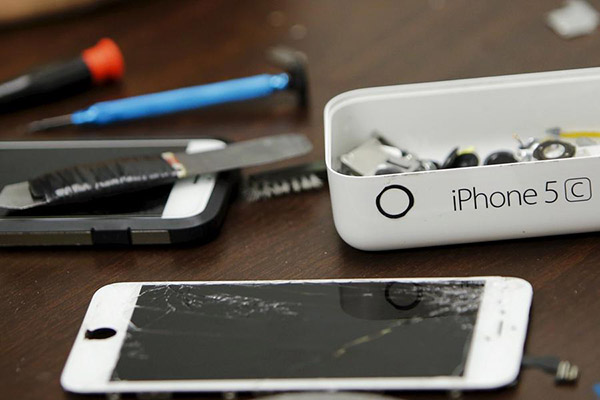San Bernardino victims to oppose Apple on iPhone encryption
(Agencies) Updated: 2016-02-22 10:22
 |
|
Pieces of an iPhone are seen on a repair store in New York, February 17, 2016. A court order demanding that Apple Inc help the U.S. government unlock the encrypted iPhone of one of the San Bernardino shooters opens a new chapter in the legal, political and technological fight pitting law enforcement against civil liberties advocates and major tech companies. [Photo/Agencies] |
Some victims of the San Bernardino attack will file a legal brief in support of the US government's attempt to force Apple Inc to unlock the encrypted iPhone belonging to one of the shooters, a lawyer representing the victims said on Sunday.
Stephen Larson, a former federal judge who is now in private practice, told Reuters that the victims he represents have an interest in the information which goes beyond the Justice Department's criminal investigation.
"They were targeted by terrorists, and they need to know why, how this could happen," Larson said.
Larson said he was contacted a week ago by the Justice Department and local prosecutors about representing the victims, prior to the dispute becoming public. He said he will file an amicus brief in court by early March.
A Justice Department spokesman declined to comment on the matter on Sunday.
Larson declined to say how many victims he represents. Fourteen people died and 22 others were wounded in the shooting attack by a married couple who were inspired by Islamic State militants and died in a gun battle with police.
Entry into the fray by victims gives the federal government a powerful ally in its fight against Apple, which has cast itself as trying to protect public privacy from overreach by the federal government.
An Apple spokesman declined to comment. In a letter to customers last week, Tim Cook, the company's chief executive, said: "We mourn the loss of life and want justice for all those whose lives were affected," saying that the company has "worked hard to support the government's efforts to solve this horrible crime."
The Federal Bureau of Investigation is seeking the tech company's help to access shooter Syed Rizwan Farook's phone by disabling some of its passcode protections. The company so far has pushed back, arguing that such a move would set a dangerous precedent and threaten customer security.
The clash between Apple and the Justice Department has driven straight to the heart of a long-running debate over how much law enforcement and intelligence officials should be able to monitor digital communications.
The Justice Department won an order in a Riverside, California federal court on Tuesday against Apple, without the company present in court. Apple is scheduled to file its first legal arguments on Friday, and US Magistrate Judge Sheri Pym, who served as a federal prosecutor before being appointed to the bench, has set a hearing on the issue for next month.
Larson once presided over cases in Riverside, and Pym argued cases in Larson's courtroom several times as a prosecutor while Larson was a judge, he said. Larson returned to private practice in 2009, saying at the time that a judge's salary was not enough to provide for his seven children.
He said he is representing the San Bernardino victims for free.






